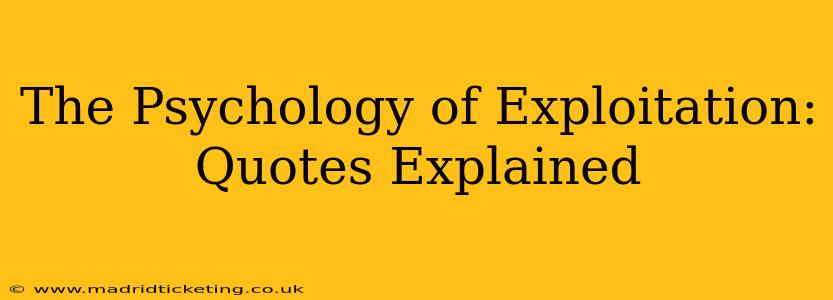Exploitation, the act of using someone or something for selfish gain, is a complex phenomenon with deep roots in human psychology. Understanding its mechanics requires delving into the motivations of both the exploiter and the exploited. This exploration will examine key psychological aspects through the lens of insightful quotes, providing context and analysis to better comprehend this pervasive issue.
What Motivates Exploiters? A Look at Power Dynamics
A common thread woven throughout the study of exploitation is the interplay of power dynamics. The exploiter often seeks to control and dominate, fueled by a need to assert their superiority. This can manifest in various ways, from subtle manipulation to overt aggression. Consider this quote: "Power tends to corrupt, and absolute power corrupts absolutely." — Lord Acton. While not explicitly about exploitation, this quote highlights the inherent danger of unchecked power, a crucial element in many exploitative relationships. The unchecked power allows the exploiter to disregard the needs and well-being of others, prioritizing their own self-interest.
The Role of Empathy (or Lack Thereof)
A significant factor in exploitative behavior is a deficit in empathy. Exploiters often struggle to understand or appreciate the perspectives and feelings of others. This lack of empathy allows them to rationalize their actions, viewing their victims as mere instruments or obstacles. The quote, "The opposite of love is not hate, it's indifference," while not directly addressing exploitation, illustrates the emotional detachment often present in exploiters. Their indifference to the suffering they inflict is a key component of their ability to perpetrate such acts.
What are the psychological traits of an exploiter?
This question delves into the personality characteristics that might predispose individuals to exploitative behavior. Research suggests several traits are often present, including narcissism, Machiavellianism, and psychopathy, sometimes grouped under the term "Dark Triad." Narcissistic individuals, for example, possess an inflated sense of self-importance and a lack of empathy, making them prone to exploiting others to meet their own needs. Machiavellianism, characterized by manipulative and strategic behavior, also contributes significantly to exploitative tendencies. Finally, psychopathy, involving a lack of remorse and empathy, further exacerbates the potential for exploitation. It's crucial to note that not everyone possessing these traits becomes an exploiter, but their presence significantly increases the risk.
How does exploitation affect the victim psychologically?
The psychological impact on victims of exploitation can be profound and long-lasting. Victims frequently experience feelings of shame, guilt, helplessness, and low self-esteem. The violation of trust and boundaries can lead to anxiety, depression, and post-traumatic stress disorder (PTSD). The effects can extend to various aspects of life, impacting relationships, work performance, and overall well-being. Understanding these impacts is crucial in providing effective support and intervention for victims.
What are the different types of exploitation?
Exploitation manifests in diverse forms, encompassing various contexts and relationships. Examples include workplace exploitation, where employees are underpaid, overworked, or subjected to unsafe conditions; financial exploitation, involving scams, fraud, or the misuse of funds; sexual exploitation, encompassing various forms of coercion and abuse; and child exploitation, a particularly egregious form involving the abuse and endangerment of minors. Each type has its own unique characteristics and requires specific approaches to prevention and intervention.
The Power of Understanding
By understanding the psychology behind exploitation, we can better identify and address this pervasive issue. This involves recognizing the motivations of the exploiter, the impact on the victim, and the various forms exploitation can take. While these quotes offer a glimpse into the complex interplay of power, empathy, and human behavior, further research and education are crucial to fostering a more equitable and just society. The fight against exploitation requires a multi-faceted approach, encompassing legal frameworks, societal awareness, and the promotion of empathy and ethical behavior.

